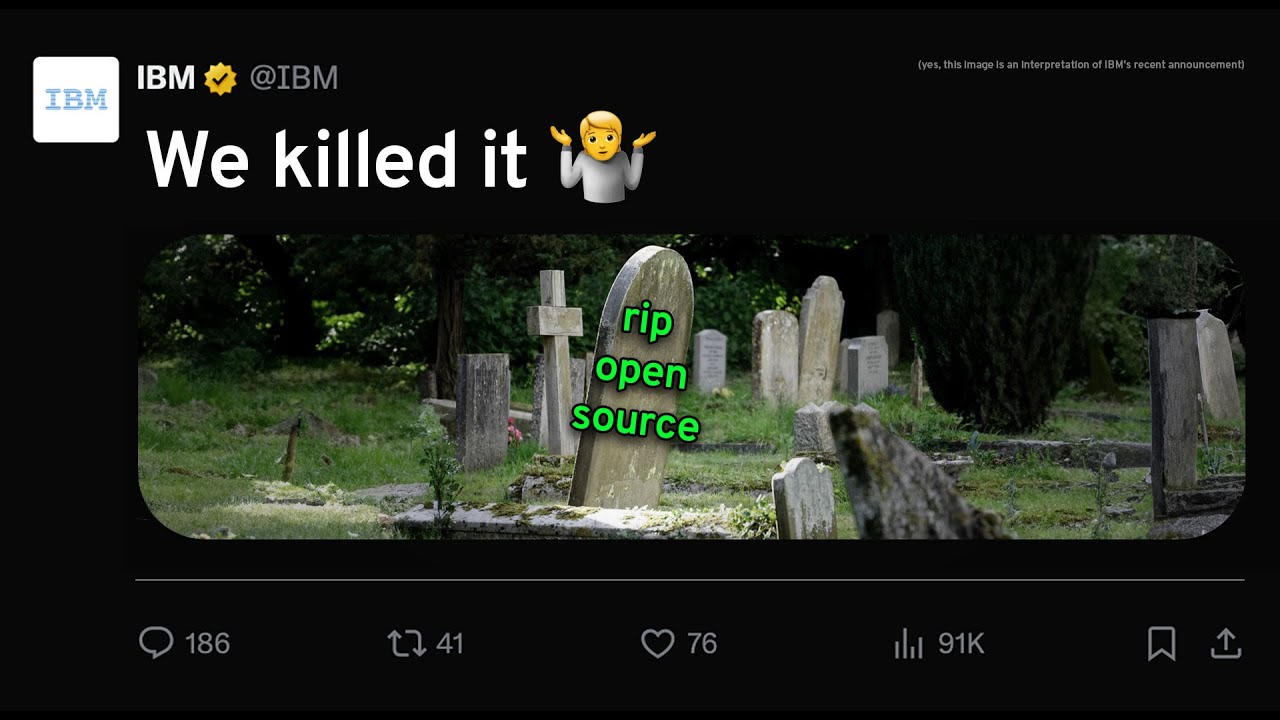Corporate
Open source
Pick one. Capitalism cannot abide anything not being commodified. “Corporate open source” is an inherently contradictory term.
I’m not here to defend capitalism, only to say that capitalism and open source have had a more complicated relationship than that.
The Apache HTTP Server was the preeminent dot-com era open source project. It’s hard to imagine the dot-com boom without it. People seem to forget that it was corporate open source. It was “a patchy server” developed (from NCSA HTTPd) and maintained largely by internet startups like Organic, Inc. Many other critical components of the dot-com tech stack were similarly developed.
The fundamental problem I see here is the cloud. We were supposed to have easy self hosted applications and data on cheap always-online hardware. Instead, companies promoted cloud services with the intention of rent seeking through subscriptions.
If you look at the software that went from open source to source available, you’ll notice that almost all of them are cloud applications. Why? The companies that created them were hoping to make money through the same subscription model. But then, big cloud players like AWS just outcompeted them using their own software.
Would this have happened if the FOSS ecosystem neglected the cloud hype and gravitated towards self hosting? Perhaps. But not as badly. We still haven’t seen enough progress towards self hosting. It’s still very hard for regular folks. Genuine efforts like sandstorm didn’t find enough momentum. I hope this changes at least now.
How do you suggest self-hosting should be made easier while at the same time making offering the same software as a service harder?
Basically the bits that are hard for people about self-hosting is that you need to learn about concepts you have no previous experience with. This can only be mitigated by abstracting those concepts away to some degree and automating more but those are exactly the same steps that make offering the software as a service easier too.
I see more and more businesses realizing the trade-off they’re actually doing when they give in and get cloud services instead of hosting your own hardware and hiring your own team.
Yes, the up-front overhead cost is much larger, but there’s been a lot of fuckups at these big companies recently and a lot more valid reasons for companies to be justifying bringing everything back in-house instead of living in the cloud.
Part of that is the growth of open source cloud applications, so you can still have it all “in the cloud” but that cloud is still owned, operated, and administered by your own team, in a physical location you can access. A lot of the same benefits just with more technical overhead.
A contributor license agreement, or CLA, usually (but not always) includes an important clause: a copyright assignment.
This is a strategy employed by commercial companies with one purpose only: to place a rug under the project, so that they can pull at the first sign of a bad quarter. This strategy exists to subvert the open source social contract. These companies wish to enjoy the market appeal of open source and the free labor of their community to improve their product, but do not want to secure these contributors any rights over their work.
List of some companies that use CLAs: https://en.wikipedia.org/wiki/Contributor_License_Agreement#Users
First link gives an SSL warning for me. Here’s the WayBackMachine link https://web.archive.org/web/20240425192244/https://drewdevault.com/2023/07/04/Dont-sign-a-CLA-2.html
Maybe your browser doesn’t like Let’s Encrypt certificates.
No issues here whatsoever with other sites, including those that use L.E. certs. Weird. I guess it is a Tor circuit related issue. On another browser without Tor it loads fine.
I’m surprised that other people are surprised that for-profit companies constantly try to increase their profits; such companies only contribute to FOSS when that’s more profitable than the alternative. The Linux kernel, AMDGPU, Steam, etc only exist because some part of the software/hardware stack is proprietary (which becomes a more attractive product as the FOSS portion of the stack improves).
I’m definitely not justifying the “rug-pulling”, but people need to stop supporting projects with no potential for long-term profitability unless those projects can survive without any support from for-profit companies. Anything else is destined to fail.
Here is an alternative Piped link(s):
https://piped.video/watch?v=hNcBk6cwim8
Piped is a privacy-respecting open-source alternative frontend to YouTube.
I’m open-source; check me out at GitHub.
Great video. I actually bought the domain opensource.rip a few weeks ago, just to list the affected projects and explain exactly what jeff geerling did here. Haven’t started it yet, and I’m mostly commenting just to make myself commit to the idea.
Intending to create a static site with Zola, lmk if you wanna contribute. Submitting information like I asked for in the following post would already help me out :)







